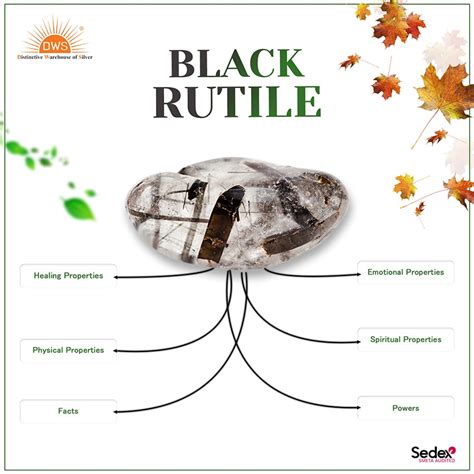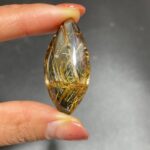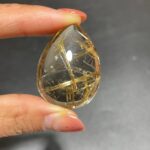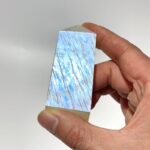Calcite, a versatile mineral composed primarily of calcium carbonate, has captivated humans for centuries with its exceptional optical properties and diverse applications. Embodying transparency and functionality, this remarkable crystal unravels a world of endless possibilities, inviting us to explore its enchanting allure.

Optical Marvel
Calcite’s most striking characteristic is its birefringence, a phenomenon that allows it to split a single beam of light into two distinct rays. This unique optical property arises from calcite’s crystalline structure, which consists of a trigonal arrangement of calcium and carbonate ions. As light passes through calcite, its polarization is split into ordinary and extraordinary rays, resulting in double refraction.
The birefringence of calcite has been harnessed in numerous optical instruments, including polarizing filters, Nicol prisms, and calcite wedges. These devices have played a crucial role in various fields, ranging from microscopy and crystallography to petrography and mineralogy.
Industrial Significance
Beyond its optical prowess, calcite also holds immense industrial value. As a major source of calcium carbonate, it is widely used in the production of cement, glass, and other construction materials. Calcite powder is commonly employed as a filler in paper, plastics, and paints, enhancing their opacity and whiteness.
The pharmaceutical industry utilizes calcite as an antacid and calcium supplement, while the agricultural sector employs it as a soil conditioner to neutralize acidity and improve crop yield. Additionally, calcite finds applications in cosmetics, abrasives, and ceramics.
Crystal Healing and Metaphysical Beliefs
Calcite has been revered in crystal healing practices for centuries. It is believed to promote emotional stability, reduce stress, and enhance communication. Some practitioners associate calcite with the throat chakra, suggesting its ability to improve vocal expression and facilitate clear speech.
While scientific evidence to support these metaphysical beliefs remains elusive, countless individuals attest to the positive effects of calcite on their physical and emotional well-being.
Table 1: Physical Properties of Calcite
| Property | Value |
|---|---|
| Chemical composition | CaCO₃ |
| Crystal system | Trigonal |
| Mohs hardness | 3 |
| Specific gravity | 2.71 |
| Color | Transparent, white, or various hues |
| Transparency | Transparent or translucent |
| Cleavage | Perfect in three directions |
| Luster | Vitreous |
Applications in Engineering and Architecture
Calcite’s unique optical properties have garnered interest in the field of engineering and architecture. Researchers are exploring the use of calcite crystals in novel optical devices, such as lenses, filters, and waveguides. By manipulating the birefringence of calcite, these devices can achieve remarkable optical effects, revolutionizing optics.
The construction industry is also embracing calcite’s versatility. Architectural applications include the incorporation of calcite tiles and panels in building facades, creating dynamic and visually engaging structures. Utilizing calcite’s translucent qualities, architects can design buildings that interact with natural light, producing stunning effects.
Table 2: Applications of Calcite in Various Industries
| Industry | Application |
|---|---|
| Construction | Cement, glass, fillers |
| Pharmaceuticals | Antacid, calcium supplement |
| Agriculture | Soil conditioner |
| Cosmetics | Abrasives, ceramics |
| Optical instruments | Polarizing filters, prisms |
Table 3: Calcite’s Impact on Human Well-being
| Aspect | Impact |
|---|---|
| Crystal healing | Emotional stability, stress reduction |
| Metaphysical beliefs | Improved communication, energy flow |
| Physical effects | Anecdotal evidence of pain relief, discomfort reduction |
Table 4: Potential Applications of Calcite in Emerging Fields
| Field | Potential Applications |
|---|---|
| Optics | Lenses, filters, waveguides |
| Architecture | Dynamic facades, light-responsive buildings |
| Energy | Solar cells, optical energy storage |
| Electronics | Piezoelectric sensors, high-frequency resonators |
| Biomedical | Bone implants, tissue engineering |
Calcite’s Impact on Our Understanding of the Earth
Calcite plays a pivotal role in the study of geology and paleontology. It serves as a primary component of sedimentary rocks, such as limestone and marble, which contain fossilized remains that provide valuable insights into Earth’s history and biodiversity.
Paleontologists meticulously examine calcite formations to decipher the evolutionary trajectories of ancient organisms and reconstruct past environments. By studying calcite crystals in sedimentary rocks, scientists can unravel the geological processes that have shaped our planet over millions of years.
Step-by-Step Approach to Using Calcite
For those interested in incorporating calcite into their lives, here is a practical step-by-step guide:
- Identify your needs: Determine whether you seek calcite for its optical, industrial, or metaphysical properties.
- Choose the appropriate form: Select the most suitable form of calcite, such as crystals, powder, or tiles, based on your intended use.
- Prepare the calcite: Cleanse the calcite using gentle methods, such as salt water or smudging, to remove any impurities.
- Experiment and observe: Incorporate calcite into your environment or practice, experimenting with different ways to interact with it. Observe the effects and adjust accordingly.
- Seek professional guidance: If you have specific health or healing concerns, consider consulting a qualified crystal healer or other healthcare professional.
Frequently Asked Questions
Q: Can calcite be harmful?
A: Calcite is generally considered non-toxic, but ingestion of large quantities may cause gastrointestinal discomfort.
Q: What is the best way to store calcite crystals?
A: Store calcite crystals in a cool, dry place away from direct sunlight. Protect them from scratches by wrapping them in soft fabric or storing them in a padded box.
Q: How can I enhance the optical effects of calcite?
A: Place calcite crystals in a room with plenty of natural light or use artificial lights to highlight their birefringent properties.
Q: Can I use calcite for meditation?
A: Yes, calcite is believed to promote emotional stability and enhance communication, making it a suitable crystal for meditation.
Q: What is calcite’s role in energy storage?
A: Researchers are exploring the use of calcite crystals in advanced optical energy storage systems.
Q: How durable is calcite?
A: Calcite has a Mohs hardness of 3, making it relatively soft. It is vulnerable to scratches and should be handled with care.
Q: Can calcite be used in jewelry?
A: Yes, transparent calcite crystals can be cut and polished into gemstones for use in jewelry.
Q: What is the significance of calcite in architecture?
A: Calcite tiles and panels are gaining popularity in architecture, creating dynamic and visually engaging building facades that interact with natural light.




























